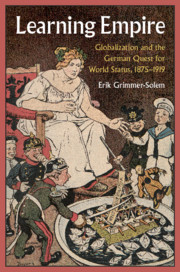Book contents
- Learning Empire
- Learning Empire
- Copyright page
- Contents
- Illustrations
- Acknowledgments
- Abbreviations
- Introduction
- Part I Absent-Minded Empire, 1875–1897
- Part II Empire Imagined, 1897–1907
- 4 World Policy
- 5 The High Seas Fleet and Power Politics
- 6 National Efficiency and the New Mercantilism
- 7 Formal and Informal Empire
- 8 Empire in Crisis
- Part III Empire Lost, 1908–1919
- Epilogue
- Selected Bibliography
- Index
8 - Empire in Crisis
from Part II - Empire Imagined, 1897–1907
Published online by Cambridge University Press: 20 September 2019
- Learning Empire
- Learning Empire
- Copyright page
- Contents
- Illustrations
- Acknowledgments
- Abbreviations
- Introduction
- Part I Absent-Minded Empire, 1875–1897
- Part II Empire Imagined, 1897–1907
- 4 World Policy
- 5 The High Seas Fleet and Power Politics
- 6 National Efficiency and the New Mercantilism
- 7 Formal and Informal Empire
- 8 Empire in Crisis
- Part III Empire Lost, 1908–1919
- Epilogue
- Selected Bibliography
- Index
Summary
After a series of brutal and costly colonial wars in German Africa and legislative impasses in the Reichstag, Chancellor Bülow called new elections in 1906 to forge a stable legislative bloc of liberal and conservative parties. This chapter analyzes how Schmoller, Sering, and the other fleet professors mobilized for this election campaign to support the colonial reform program of the new Colonial Director Bernhard Dernburg as a new prong of “World Policy.” This campaign generated much new imperialist propaganda that would have a lasting impact in Germany. As the colonial crisis subsided, the Baghdad railroad faced new financial and political challenges that Karl Helfferich was called to surmount. Formal professor exchanges between the United States and Germany were initiated to help improve deteriorating relations with the United States, with Hermann Schumacher serving as the first Kaiser Wilhelm Professor to Columbia University from 1906 to 1907. The United States was now an imperial power, and Schumacher’s extensive travel through the country and to Cuba revealed its vast potential but also its challenges to Germany. Strong parallels were suggested with Russia, reinforcing more Eurasian aspirations for German “World Policy.”
Keywords
- Type
- Chapter
- Information
- Learning EmpireGlobalization and the German Quest for World Status, 1875–1919, pp. 340 - 388Publisher: Cambridge University PressPrint publication year: 2019

